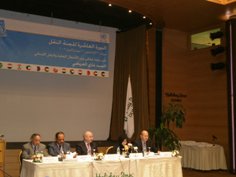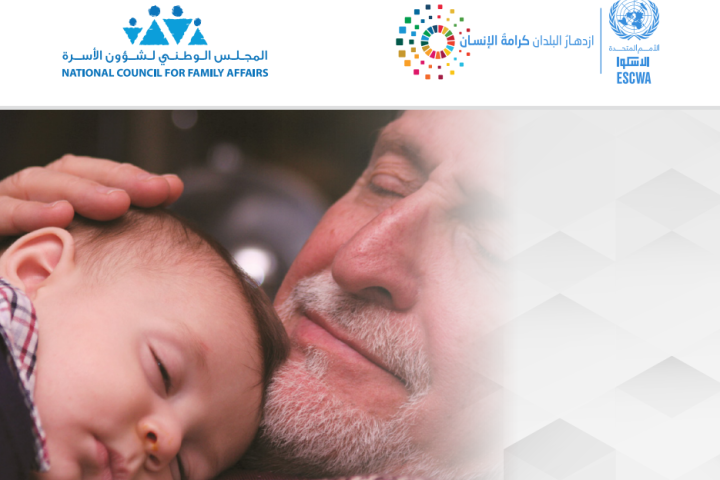"Without veins, the body stops working. The flow of transport is highly similar to that of the rush of blood in your veins; any deficiency that affects it spreads throughout the body". With these words, Nabil Safwat, Chief of Economic Development and Globalization Division (EDGD) at UN-ESCWA, laid out the importance of transport, namely in a region that groups developing countries. The extension of transport axes increases interaction among countries, and the facilitation of movement within the same country as well as with other countries boosts its power to achieve the Millennium Development Goals (MDGs). This is especially true for the Sudan, which has requested to accede to the three transport agreements adopted in the UN-ESCWA region.
UN-ESCWA has recently concluded the tenth session of its Transport Committee (31 march-2 April 2009; Beirut), with noteworthy recommendations that underscored two essential issues: the harmonization of institutional frameworks and legislation in the transport sector in the UN-ESCWA region; and the request by the Sudan to accede to UNI-ESCWA transport-related agreements. The meeting was widely attended, gathering a crowd of representatives from member countries, alongside regional and international organizations such as the Cooperation Council for the Arab States of the Gulf (GCC), the Arab Federation of Chambers of Shipping (AFCS), the League of Arab States (LAS), the World Bank, the Saudi Fund for Development, and others.
Transport and Money
The transport sector stands out in the UN-ESCWA region, which faces challenges and problems in this field that include the weak infrastructure; the non-integrated transport systems; the impediments to the movement of goods and persons; the limited commercial exchanges among these countries; the logistical issues as well as legal and institutional systems in trade and transport, and other hurdles. These obstacles leave a negative impact on the leading role transport plays in energizing economic situations in the region's countries and improving regional integration so these countries could develop a competitive edge in the global economic market, especially in the time being.
This point has compelled UN-ESCWA to focus on stimulating this issues, at a time when the world is tackling an unexpected financial crisis that has left great imprints on the political, economic and financial spheres, and whose grip reached the transport sector as well according to Lebanese Minister of Transport, Ghazi Aridi, who sponsored the opening of the Transport Committee's Tenth session. The sector was affected on the levels of "vehicle production, land transport, aircraft production, maritime transport and ships", Aridi said, calling for revitalizing transport maps and seizing opportunities offered by the geographical location to invest, and activate movement and communication among peoples and countries on the level of individuals as on that of economic and trade exchange. UN-ESCWA Executive Secretary, Bader Omar AlDafa also tackled the issue of the financial crisis, explaining that it was important to intensify investments in the transport sector and in the infrastructure to face its consequences, especially since "the transport sector remains an essential element to achieve development and regional integration and improve the livelihood of peoples in the region" AlDafa said.
Regional Agreements
AlDafa also noted the collaboration between UN-ESCWA and LAS in elaborating the planned rail network connecting Arab countries, adopted in the Arab Economic, Social and Development Summit, held in Kuwait in January 2009. Together with the Yemeni Transport Ministry, UN-ESCWA is currently preparing an economic feasibility study to establish a railway network in Yemen.
The Executive Secretary remarked that the Council of Arab Ministers of Transport has agreed in its Twenty-first Session (29 October 2008/ Port Said) on the unified text of the Multimodal Transport Agreement among Arab Countries, between UN-ESCWA and LAS. The council has decided to submit the draft agreement to concerned parties in LAS Secretariat for adoption, before it is submitted for ratification by Arab countries.
The Tenth Session
The Transport Committee meeting aimed at reviewing the achievements of member countries in cooperation with UN-ESCWA Secretariat since the ninth session of the Transport Committee (March 2008/Beirut), as well as reviewing the implementation of agreements, mechanisms and recommendations related to the facilitation of the efficiency of the transport sector in all its fields. For her part, Hanan bint Salem bin Seif Al Rahbiya, representative of Oman, which has presided over the office of the ninth session pointed out that the Committee's work also includes the review of the implementation of the Integrated Transport System in the Arab Mashreq (ITSAM), to facilitate trade and transport among countries of the region and achieve regional integration.
Palestine chaired the Tenth session of the Committee on Transport, while Oman and Qatar were named vice-chairs and Kuwait rapporteur. The Session underlined the harmonization of institutional frameworks and legislation in the UN-ESCWA region transport sector, welcoming Sudan as a new member of the three agreements adopted in the Regional Commission, and urging its speedy deposit of the instrument of accession with the UN Secretary-General. Recommendations also included the approval of additional axes for international roads and railways that the Sudan presented and the follow-up on the recommendations of the Committee in its ninth session.
UN-ESCWA has recently concluded the tenth session of its Transport Committee (31 march-2 April 2009; Beirut), with noteworthy recommendations that underscored two essential issues: the harmonization of institutional frameworks and legislation in the transport sector in the UN-ESCWA region; and the request by the Sudan to accede to UNI-ESCWA transport-related agreements. The meeting was widely attended, gathering a crowd of representatives from member countries, alongside regional and international organizations such as the Cooperation Council for the Arab States of the Gulf (GCC), the Arab Federation of Chambers of Shipping (AFCS), the League of Arab States (LAS), the World Bank, the Saudi Fund for Development, and others.
Transport and Money
The transport sector stands out in the UN-ESCWA region, which faces challenges and problems in this field that include the weak infrastructure; the non-integrated transport systems; the impediments to the movement of goods and persons; the limited commercial exchanges among these countries; the logistical issues as well as legal and institutional systems in trade and transport, and other hurdles. These obstacles leave a negative impact on the leading role transport plays in energizing economic situations in the region's countries and improving regional integration so these countries could develop a competitive edge in the global economic market, especially in the time being.
This point has compelled UN-ESCWA to focus on stimulating this issues, at a time when the world is tackling an unexpected financial crisis that has left great imprints on the political, economic and financial spheres, and whose grip reached the transport sector as well according to Lebanese Minister of Transport, Ghazi Aridi, who sponsored the opening of the Transport Committee's Tenth session. The sector was affected on the levels of "vehicle production, land transport, aircraft production, maritime transport and ships", Aridi said, calling for revitalizing transport maps and seizing opportunities offered by the geographical location to invest, and activate movement and communication among peoples and countries on the level of individuals as on that of economic and trade exchange. UN-ESCWA Executive Secretary, Bader Omar AlDafa also tackled the issue of the financial crisis, explaining that it was important to intensify investments in the transport sector and in the infrastructure to face its consequences, especially since "the transport sector remains an essential element to achieve development and regional integration and improve the livelihood of peoples in the region" AlDafa said.
Regional Agreements
AlDafa also noted the collaboration between UN-ESCWA and LAS in elaborating the planned rail network connecting Arab countries, adopted in the Arab Economic, Social and Development Summit, held in Kuwait in January 2009. Together with the Yemeni Transport Ministry, UN-ESCWA is currently preparing an economic feasibility study to establish a railway network in Yemen.
The Executive Secretary remarked that the Council of Arab Ministers of Transport has agreed in its Twenty-first Session (29 October 2008/ Port Said) on the unified text of the Multimodal Transport Agreement among Arab Countries, between UN-ESCWA and LAS. The council has decided to submit the draft agreement to concerned parties in LAS Secretariat for adoption, before it is submitted for ratification by Arab countries.
The Tenth Session
The Transport Committee meeting aimed at reviewing the achievements of member countries in cooperation with UN-ESCWA Secretariat since the ninth session of the Transport Committee (March 2008/Beirut), as well as reviewing the implementation of agreements, mechanisms and recommendations related to the facilitation of the efficiency of the transport sector in all its fields. For her part, Hanan bint Salem bin Seif Al Rahbiya, representative of Oman, which has presided over the office of the ninth session pointed out that the Committee's work also includes the review of the implementation of the Integrated Transport System in the Arab Mashreq (ITSAM), to facilitate trade and transport among countries of the region and achieve regional integration.
Palestine chaired the Tenth session of the Committee on Transport, while Oman and Qatar were named vice-chairs and Kuwait rapporteur. The Session underlined the harmonization of institutional frameworks and legislation in the UN-ESCWA region transport sector, welcoming Sudan as a new member of the three agreements adopted in the Regional Commission, and urging its speedy deposit of the instrument of accession with the UN Secretary-General. Recommendations also included the approval of additional axes for international roads and railways that the Sudan presented and the follow-up on the recommendations of the Committee in its ninth session.




